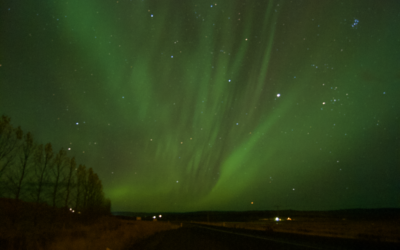I am alone on my birthday, staring up at the astronomical masterpiece of my own private ‘dark sky park’ in the middle of Australia. The town isn’t memorable – in fact, I’m certain it only consists of a post office and two or three houses. There isn’t a soul for miles. I am alone.
Lonely, but also wildly free, I meld with a breadth of sky that I’ve never witnessed in my city-girl life. I feel the enormity of my lifestyle change deep in my kishkes (yiddish, for “guts”). It’s as if a kaleidoscope has spun, leaving me fully present and part of a communal, connected, natural universe. I am nowhere. And I am home.

In the before-times, before I hunkered down with the rest of the world in a private bubble trying to avoid COVID-19, I lived as a nomad. If you hang out with a certain crowd, it doesn’t seem like such an unusual lifestyle, but the very idea throws many people into a flummox.
I’ve been on the receiving end of the derisive and passive aggressive, “I could never do that,” spouted by people who were jealous of my freedom or too fearful to venture out alone. I always felt that the snide expression on the face of my accuser (the tone of the declaration was clear) belied a kind of sadness and confusion at the very idea that there is another way to live. These comments stung. It’s easy to feel like a freak as a solo nomad. But then, I’d dive a coral wall or toast a marshmallow on lava at a live volcano or hang out with other nomads and – presto – automatic attitude adjustment.
More often than slights, curious people ask how I developed this lifestyle – how I designed my life to support my wanderlust, why I chose this path, and how they can do so as well. As we chat, I can practically see their minds shuffle through their own motivations.
This is really where it begins, as always: purpose. How would living as a nomad put you or keep you on your path – the path to the life you desire, the path that aligns with your values, the path that brings meaning to your time on this spinning orb? Groking this bit of personal knowledge in your kishkes also minimizes uncertainty and fear when things go awry and the stability of the life you left is wailing it’s siren song.
Three Reasons Why I Chose to Wander
My choice to wander was purposeful and strewn with whys large and small, but the most powerful drivers are noteworthy.
Why #1: It was time to find my next home
I’m a coaster (my term for those who’ve lived on both US coasts), but my career brought me to and kept me in Chicago for fifteen years. I’d been ready to leave for about half that time, and my personality was never a great fit for the midwest. I’m not capable of the surface-level niceness that characterizes this region. In brief, my instinct to bolt far preceded my exit. It was time to go.
All of us have wants and needs, whether or not we’re fully conscious of them. I set out to find my new permanent home by making my own list. But it’s the ephemeral that can’t be enumerated from the armchair. I needed to be out there. To get the feel for each place and its people (in my kishkes, of course). I needed a place that valued community and would be happy to wrap me in its folds. A place where I could bring my whole self, without shaving off the parts that don’t quite fit. Oh, and weather. No more shovels in May, goose down in September, or perpetual grey skies. Sunny and warm, please, no doubt about it.
Why #2: A lifetime of travel deprivation
My parents had personal and familial scars that precluded a life well-lived. WWII, pogroms in Poland, prejudice in the US, the impact of the great depression – so much pain. One way that manifested itself was a pathological frugality. There was no travel. No family trips. Not even weekends at the beach nearby. The point is, I only set foot out of the country on the occasional Niagara Falls or Toronto excursion until I was twenty-nine. Listening to John Denver’s ‘Rocky Mountain High’ on repeat was the closest I came to seeing a mountain – far from the songlines of the Aussie outback.
My first trip to Europe was a tantalizing success. I climbed parapets of ruined castles, soaked in the spirits of Stonehenge, befriended sheep in a national park where they outnumbered humans 50:1, and gave the Blarney Stone an outsized smooch, sending out a prayer for a lifetime of travel – all in the span of three weeks. Like any addiction, my first taste of travel left me craving more.
Unfortunately, I worked sixty hours a week at the time and had no extra cash. When I decided to return to grad school, things only became more difficult – adding debt to the list of obstacles. I certainly didn’t have time for much travel during those years or those that followed, while I established my academic career, private practice, and coaching business.
By the time my career was robust and my finances were flush, I needed to make up for lost time. Nothing short of nomading would do.
Why #3: Because I could
When I left Chicago, I was coming off a devastating period of loss – all my immediate relatives died in close proximity to one another, a serious relationship ended painfully, my closest Chicago friends had departed one-by-one for the same reasons I hoped to leave, and my health was compromised in multiple ways. The only silver lining to this well of grief was the space and freedoms those losses created. Suddenly, I was untethered from relational responsibilities and my life was my own.
Leaving Chicago and living a traveler’s life had been a twinkle in my eye for some time, so I’d spent years transitioning most of my patients and clients to teleconferencing modalities, long before Zoom was a thing. This adventure was part providence and part deliberate plan.
Clarifying Your Why
The nomadic lifestyle is brimming with positives – adventure, culture, freedom, newfound friendships and connections – but the challenges are not for the faint-hearted. Loneliness and burnout are the key emotional snags, accompanied by the administrative mess of health insurance, medical care, taxes, communication, and living arrangements.
If you don’t want to rely on luck, successful change always starts with the why – especially when it’s a huge shakeup, like hitting the road as a lifestyle.
There are some kickstart questions that help me clarify the drivers any time I consider making a major change. My clients and friends have found this process of self-assessment helpful and it’s particularly useful to elicit less obvious whys.
- Values Assessment
It’s impossible to clarify your purpose without nailing your values. For some, these are obvious, but for many there’s a difference between the values we aspire to and the values we actually live. And sometimes, in chasing a bright, shiny object like an overseas adventure, we can lose sight of what really matters.
What are your top five values? Which of these would be enhanced by a life on the road? Would any suffer? If so, is the sacrifice worthwhile?
If you need some help exploring this, start with the free VIA Survey of Character Strengths, which will sort out your “Values in Action.” This survey, authored by famed psychologists Martin Seligman and Christopher Peterson, has been taken by hundreds of thousands of participants, so the feedback you receive is robust. - Happiness Query
One simple question: How will this lead me toward a richer, more meaningful life?
Reams of research papers confirm that humans are terrible at guessing what will make them happy. And even if we guess correctly, those hits of happiness fade so rapidly that it’s downright depressing.
Meaning is a much better focal point for building a worthwhile life because the more meaning we find in life, the more happy we typically feel. It creates a virtuous cycle, so that the more happy we feel, the more we feel motivated to pursue greater meaning and purpose.
Psychologist Roy Baumeister once said, “Humans may resemble many other creatures in their striving for happiness, but the quest for meaning is a key part of what makes us human, and uniquely so.” Honor your humanity.
- Making hard choices
What are other possible choices? What will I be missing by living a nomadic life?
There are obvious questions that must be asked and, in fact, would be nearly impossible to avoid. Your psyche will force you to face these and, failing that, your friends and family will step in.
That said, you’ll probably be left with something specific: a hard choice. Hard choices are those for which there is no best option because all the options are good.
The two exercises above can deepen your self-inquiry and guide your decision-making. This is where you take a stand on who you really are and who you want to be. In making the hard choice, you become the author of your own destiny. This is more than an opportunity to travel or switch things up or experience a different culture. When it comes to hard choices, taking a stand is the equivalent of deciding who you want to be.
Pandemic not-withstanding, it’s easy to travel. And you can embark on a nomadic lifestyle without this type of deep self-inquiry. But in order to be transformational, change needs to be conscious and intentional. Hopefully, these exercises will help you start that journey.

I’m no longer staring up at a wide-open sky. Instead, I’m sequestered in an office. But it’s constructed of floor-to-ceiling windows and the view is a stunning city skyline, a beauty I appreciate with adventure-refreshed eyes. For now, I’m grateful for my safety and security – no small thing in tumultuous times.
While travel is restricted and our worlds seem small in many ways, this is the time to dream big – to imagine the life that can unfold in the after-times. The pandemic has given us time to reflect, to research the possibilities, and to plan. All that inner work will smooth the way later.
I’m dreaming of my next adventure. How about you? We’ll be back on the road soon.





0 Comments